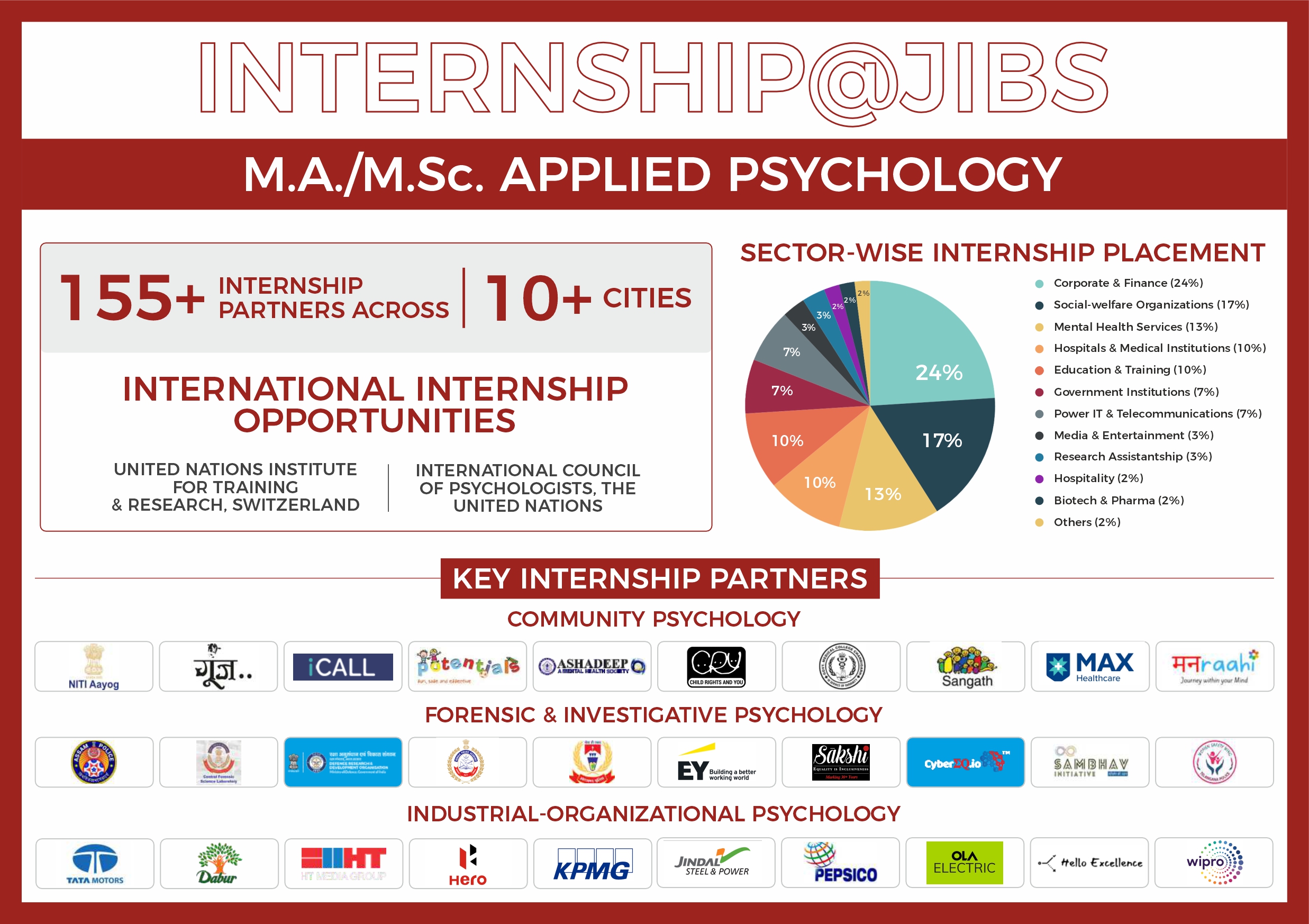Applied psychology is a dynamic discipline focused on the practical application of psychological theories and principles to address real-world challenges related to human behaviour, cognition, and social functioning.
Unlike academic psychology, which emphasizes theory, applied psychology is oriented towards solving practical problems faced by individuals, groups, and organizations in everyday settings.
The M.A./M.Sc. Degree in Applied Psychology at the Jindal Institute of Behavioural Sciences (JIBS) is awarded following completion of a two-year residential programme. This programme is committed to the study and application of psychological principles and behavioural research. It aims to instill the necessary knowledge, skills, and values, preparing our postgraduates for immediate employment or doctoral studies.
At JIBS, during the second year of your study, you can choose to specialize in Child Psychology, Sports Psychology, Forensic & Investigative Psychology, and Industrial & Organizational Psychology., Students are encouraged to pursue the specialization that best aligns with their interested and long-term professional objectives.
Specialisations:

The Jindal Institute of Behavioural Sciences strives to provide students with the highest quality education and training in Behavioural Sciences, making it a leading choice among Applied Psychology students in India.
To graduate, a student must complete the following꞉
Duration- 2 Years
Course Structure
| Year | Semester | Subject | Credits |
|
I Year |
I |
|
4 |
|
II |
|
4 |
|
|
II Year Specialization: Child Psychology |
III |
|
4 4 4
2 |
|
IV |
|
4
2 |
|
|
II Year Specialization: Sports Psychology |
III |
|
4 4 |
|
IV |
|
4
2 |
|
|
II Year Specialization: Forensic & Investigative Psychology |
III |
|
4 4 4 4 |
|
|
IV |
|
4 4
2 |
|
II Year Specialization:
Industrial & Organizational Psychology |
III |
|
4 |
|
IV |
Engagement, Cross cultural Management, People Analytics, Developing and Implementing Competency Models and Assessment Centres and Consulting and Project Management etc.)
Workplace, Occupational Health and
|
4 4
2 |
To be able to apply for MA/MSc Applied Psychology at JIBS, candidates must fulfill the following eligibility requirements:
Candidates need to pay an Application fee of ₹1000.
Important Advisory for Students and Parents
O.P. Jindal Global University (JGU) does not appoint or authorise any agent, intermediary, or consultant for admissions to any the undergraduate, postgraduate and doctoral programmes offered by JGU.
If any individual or organisation approaches you demanding money, donations, or favours for admission, please immediately report the matter to the police and to the Registrar of the O.P.Jindal Global University at registraroffice@jgu.edu.in
All admissions to JGU’s academic programmes are conducted strictly on merit. JGU has no management quota, no donation/capitation seats, no NRI/Foreign National quota, and no special quota of any kind.
Paying or offering any form of donation or capitation fee for admission to JGU is illegal, and individuals involved in such activities are liable for criminal prosecution.
For all official information and admission-related queries, please contact the Admissions Office directly and apply only through the University’s official website: www.jgu.edu.in
Tuition Fees*: 3,50,000 (INR per annum)
| Particulars | Amount in (Rs.) |
| Residential Charges per Year* | 2,31,100 per annum |
| Other Allied Service Charges (Other Allied Services, including but not limited to food, Laundry, Security Services, Housekeeping charges, electricity etc., per annum* |
1,24,900 per annum |
| Refundable Security Deposit** (One time payment) | 50,000 |
*The Tuition fee, residential charges and other allied service charges are subject to an annual increase of ten percent (10%).
**The security deposit will be fully refunded, subject to the completion of studies and/or receipt of a ‘No Dues Certificate’. The security deposit shall not carry any interest.
Placement Opportunities
Key Highlights
Placement Success
Designated Roles
Recruiters
O.P. Jindal Global University awards Merit-cum-Means Scholarships (MCM). The MCM Scholarships covers the first year tuition fee only. Scholarships applications are opened by the University in July and will be awarded to eligible students in August. The eligibility criteria includes Income proof of parents, entrance exam, graduation score and faculty interaction. Weightage will also be given to curricular and non & curricular achievements.
Family ITR should not exceed INR 50 lakhs per annum in the latest returns.
JGU has established tie-ups with AVANSE (ICICI), Dena Bank and Credila (HDFC) to facilitate educational loans for students who are admitted to the M.A./M.Sc. Applied Psychology and M.Sc. Psycho-social Rehabilitation programmes.
